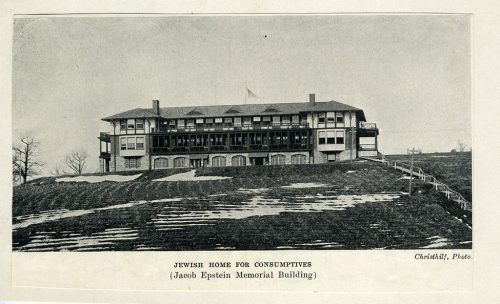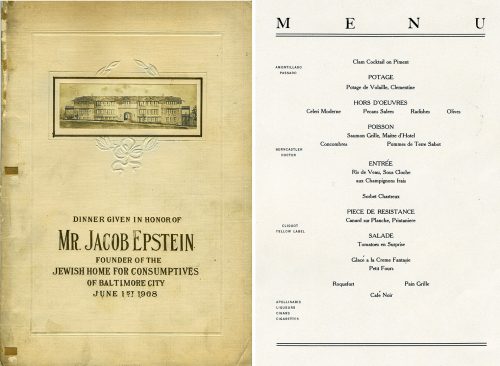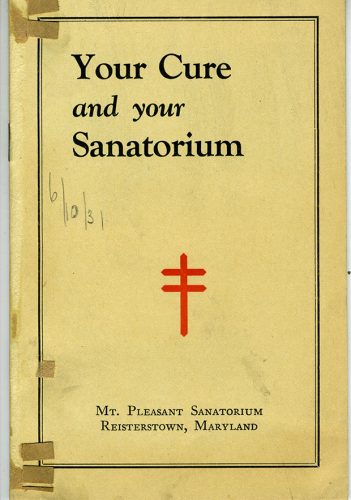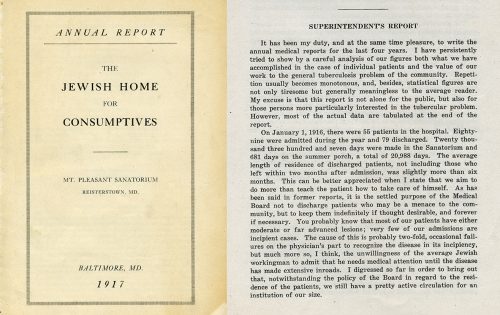The Mount Pleasant Jewish Home for Consumptives
A Personal Connection
Blog post by JMM archivist Lorie Rombro. You can read more posts by Lorie here.

In 1907 Jacob Epstein gave $35,000 to the Federated Jewish Charities for a tuberculosis hospital and another $500 annually toward supporting the institution. Seventy-two acres were purchased off Westminster Pike, north of Reisterstown and the Jewish Home for Consumptives, also known as Mount Pleasant was opened in 1908.
I knew very little about Mount Pleasant prior to working here at the Museum, but what I did know was through my own family history. When WWII began my grandfather, who had recently married my grandmother, went to register for the Navy. At the physical it was discovered that he had tuberculosis, although he had no symptoms. My grandfather proceeded to spend the next year at Mount Pleasant. He always believed that he had contracted tuberculosis from living at a boarding house in Baltimore when he first arrived from New York, but would never know the true cause.

I was excited to find a large portion of the 1926-1932 Associated scrapbook dedicated to the history of Mount Pleasant.
Inside the scrapbook was an incredible amount of information on the sanitorium, not just the invitations to events – which I always love to see (especially the menus),

One of the most interesting finds was a small booklet titled, “Your Cure and your Sanatorium” from 1931. JMM 2017.68.3.38
It begins with, “By coming to the Sanatorium, you have taken an important step towards recovery. Everything about this sanatorium has been planned for the sole purpose of helping you win your battle. Rest, good food and fresh air are the three most essential elements of treatment. Occasionally, medicines for the control of certain symtoms and special forms of treatment may be prescribed. Cheerfulness and determination to get well, you must supply. This will not be difficult in the company of others who are striving, like yourself, to regain health. Courage is contagious.” The booklet goes on to explain what tuberculosis is, why rest is the most imprtant step in healing, and the times of day that patients must rest, eat, and recieve treatments, a daily schedule for patients, as well as the critera for being declared well enough to return home.
Its easy to understand the ideas behind the sanitorium, hoping to create a place where people could heal and regain their strength, allowing them to return to normal life. But was the sanitorium successful?

The 1917 annual report included not only statistics for the Home, but a Superintendent’s Report as well.
In it, the superintendent, Jacob Cohen, M.D, wrote “ we aim to do more than teach the patient how to take care of himself. As has been said in former reports, it is the settled purpose of the Medical Board not to discharge patients who may be a menance to the community, but to keep them indefinitely if thought desirable, and forever if necessary. You probably know that most of our patients have either moderate or far advanced lesions; very few of our admissions are incipient cases. The cause of this is probably two-fold, occasional failures on the physcian’s part to recoginize the disease in its incipiency, but much more so, I think, the unwillingness of the average Jewish workingman to admit that he needs medical attention until the disease has made extensive inroads.” The statistics show that a majority of the people in the hospital that year where tailors or housewives and when looking at the Hebrew Orphan Asylum records many children where placed in the orphanage because one parent had either died or was being treated for tuberculosis.


